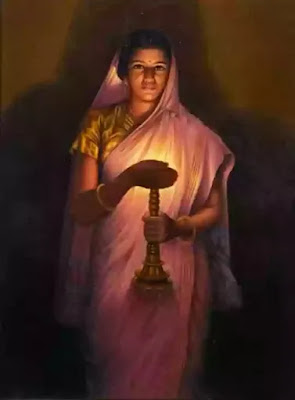Also Read
Chandran's mother is the second important female character in the novel. She is typically tradition-bound, orthodox, conservative, conformist and a homely woman. As a mother, she abounds in love for her son. She always thinks in terms of his welfare and well-being. In case of Chandran's marriage, she adheres uncompromisingly to priciples of social propriety. A departure from accepted customs, rituals and norms is sacrilegious for her. She insists upon observing the set code of marriage and religious rituals. In the middle-class tradition-ridden ambience, the role of women remains confined to the fulfilment of interests of the family and they act in a subservient position. William Walsh while dilating on this point rightly comments:
"...the women rather than the old represent 'Custom and Reason' and know what is and what is not proper."
In the vortex of family relationships i.e. between father and son, son and mother, wife and husband, boy and girl, women stand for maintenance of standards of conventional propriety and observance of time-tested customs. What William Walsh says about the role of women in Narayan's novels applies fully to Chandran's mother. He says:
"It was, as Narayan shows, the duty of the women to translate and refine the principles of orthodoxy and correctness into codes and etiquettes covering the basic drive for food, shelter, sex and company"
Chandran's mother thinks with dogged insistence that the settlement of marriage has to observe certain well-set procedures and principles of social propriety. She resists tooth and nail Chandran's intention of sending a marriage proposal to the girl's parents from their side. She thinks it humiliating because according to "time-honoured practice it was the bride's people who proposed first." In case this practice is violated, she threatens saying, "I shall drown myself in Sarayu before I allow any proposal to go form here." Her threat works and Ganapathi Sastrigal is brought in as a match-maker to make a breakthrough in the matter. Noticing Chandrans importance for marriage, she exhorts him that settlement of marriage can not be made so hurriedly. It has to go through certain formalities before it is finalised. She says:
"All the same they must invite us and we must go there formally. After that they must come and ask us if you like the girl. And the terms of marriage must be discussed and settled...."
The status of the girl's family should also equal theirs. She believes in dowry as it is proper and prestigious for a good marriage. About dowry she says, "It is the duty of every father to set some money apart for securing a son-in-law. We can't disregard custom." She tells Chandran that she too brought handsome dowry in marrying his father. She has fatalistic belief about matrimonial alliance. She believes the oft-quoted line that marriages are made in heaven. While on way to Talapur to see Susila, his mother tells Chandran, "It is all settled already, the husband of every girl and wife of every man. It is in nobody's choice." She quotes her own marriage with his father as an example to prove it. She had been rejected by some three or four persons before her marriage with Chandran's father. She states that till fate decides the time and the person, a marriage cannot take place. "It is all a matter of fate," said Mother, "You can marry only the person who you are destined to marry and at the appointed time. When the time comes, let her be ugliest girl, she will look all right to the destined eye. Her views about marriage reveal her intransigent adherence to traditional code, customs and beliefs which to her are sacrosanct and inviolable. She is a die-hard orthodox.
Chandran's mother's traditional temperament gets manifested in her daily observance of religious rituals too. She daily worships gods in the morning by offering them flowers. She feels bad when she is not able to get flowers from the garden for puja as they are stolen by some one. She tells her husband that they spend thirty-five rupees per month on the upkeep of the garden for nothing. The father and Chandran succeed in catching the thief who jumps over the outer wall of their house into the garden to pluck flowers in the small hours of the morning. The person is brought inside the house. He is wearing an ochre-coloured loin cloth and has the look of a sanyasi. From a distance before seeing the man, mother asks them to punish him for stealing flowers. But as soon as she looks at the ochre-coloured loin cloth of the person, she suddenly changes her mind and asks Chandran not to trouble him. Rather she argues that he is the right person to take flowers for puja. She fears that the sanyasi may curse them. She pleads for his honourable release. This turnabout in her attitude towards the Sanyasi shows her superstitious belief in the sacredness of a person who wears an ochre-coloured cloth. Chandran remarks on this credulous religious belief of his mother. He says, "What, Mother, You are frightened of every long hair and ochre dress you see."
Unlike Malathi, the author depicts Chandran's mother as a concrete personality who espouses unyieldingly the cause of observance of orthodox practices of the Hindu middle-class society. She has direct bearing on the development of the action of the novel. She speaks, argues and participates in the events of the novel. In the case of Malathi as a character, the situation is different. There is no specific description of her personal traits. She exists in the novel by way of references and allusions made by the protagonist sporadically during the course of the novel. She nowhere speaks and lacks the normal concreteness of a character. She is like an ethereal being who exists without a solid physical frame. Herein lies the difference between the characterisation of the two.
